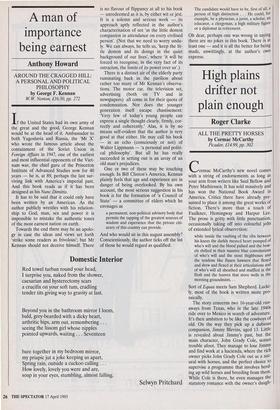A man of importance being earnest
Anthony Howard
AROUND THE CRAGGED HILL: A PERSONAL AND POLITICAL PHILOSOPHY by George F. Kennan W. W. Norton, £16.50, pp. 272 If the United States had its own army of the great and the good, George Kennan would be at the head of it. Ambassador to both Yugoslavia and Russia, the 'Mr X' who wrote the famous article about the containment of the Soviet Union in Foreign Affairs in 1947, one of the earliest and most influential opponents of the Viet- nam war, the chief guru of the Princeton Institute of Advanced Studies now for 40 years — he is, at 89, perhaps the last sur- viving link with America's imperial past. And this book reads as if it has been designed as his Nunc Dimittis.
It has to be said that it could only have been written by an American. As the author publicly wrestles with his relation- ship to God, man, sex and power it is impossible to mistake the authentic tones of the most earnest nation on earth.
Towards the end there may be an apolo- gy in case the ideas and views set forth `strike some readers as frivolous'; but Mr Kennan should not deceive himself. There is no flavour of flippancy at all to his book — unredeemed as it is, by either wit or jest. It is a solemn and serious work — its approach aptly reflected in the author's characterisation of sex 'as the little demon companion in attendance on every civilised person'. (Not that we need to worry undu- ly. We can always, he tells us, 'keep the lit- tle demon and its doings in the quiet background of our lives', where 'it will be forced to recognise, in the very fact of its ostracism, the limits of its power over us'.) There is a distinct air of the elderly party ruminating back in the pavilion about rather too many of Mr Kennan's observa- tions. The motor car, the television set, advertising (both on TV and in newspapers) all come in for their quota of condemnation. Nor does the younger generation itself escape chastisement: `Very few of today's young people can express a single thought clearly, firmly, cor- rectly and coherently.' Alas, it is by no means self-evident that the author is very good at that either. He may call his book — in an echo (consciously or not) of Walter Lippmann — 'a personal and politi- cal philosophy'. But all he has really succeeded in setting out is an array of an old man's prejudices.
One or two of these may be touching enough. In Bill Clinton's America, Kennan plainly feels that age and experience are in danger of being overlooked. By his own account, the most serious suggestion in his book is for the formation of 'a Council of State' — a committee of elders which he envisages as
a permanent, non-political advisory body that permits the tapping of the greatest sources of wisdom and experience that the private citi- zenry of this country can provide.
And who would sit in this august assembly? Conscientiously, the author ticks off the list of those he would regard as qualified:
The candidate would have to be, first of all, a person of high distinction . . He could, for example, be a physician, a jurist, a scholar, an educator, a clergyman, a high military figure or a diplomat in retirement.
Oh dear, perhaps one was wrong in saying there are no jokes in this book. There is at least one — and it is all the better for being made, unwittingly, at the author's own expense.


















































 Previous page
Previous page